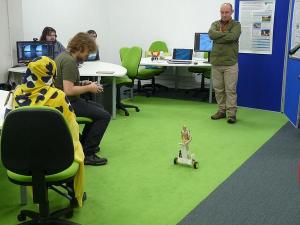News & Events
CPLab at the University's Convocation Weekend

CPLab staff demonstrated the latest research to Newcastle alumni at the Convocation Weekend event this week. Carl Gamble is shown here using a working prototype of a desktop self-balancing scooter built by CPLab staff (complete with a driver called "Ted"). The scooter is used to trial the latest multidisciplinary, collaborative design techniques for cyber-physical systems.
Cyber-physical systems bring a number of design challenges, not least the difficulty of allowing models created by engineers (to capture behaviour of the hardware) to interact with models created by software engineers (to capture aspects of of control logic). Integrating computational models of hardware and software at an early stage in the development process would greatly benefit system design. Early collaboration like this helps to identify design misunderstandings and flaws earlier, and allows engineers to explore a range of possible design solutions to find the optimal choices, all before any prototypes of the system are developed. However, achieving this type of model integration is difficult, due to the heterogeneous types of models used by software and hardware designers.
Newcastle's CPLab is at the forefront of research that advance the state of the art in this area, through participation in projects such as DESTECS, a former project that developed a collaborative simulation ("co-sim") engine to support design of dependable embedded systems, and INTO-CPS, a project currently underway that will develop an integrated tool chain to support collaborative design of cyber-physical systems.
Last modified: Thu, 25 Jun 2015 15:22:12 BST

